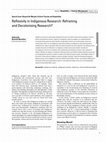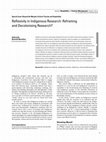Thesis by Gabrielle Russell

Abstract
Australian Aboriginal and Torres Strait Islander peoples are increasingly encouraged ... more Abstract
Australian Aboriginal and Torres Strait Islander peoples are increasingly encouraged to develop enterprises, including tourism, as a means to address the chronic disadvantage experienced in many communities. While Governments have instigated programs and policies to assist the entry of Aboriginal and Torres Strait Islander peoples into the tourism industry, there still remains a deficit of sustainable Indigenous owned and operated ventures. By examining the experiences and activities at one Aboriginal Corporation, this study sought to better understand some of the factors necessary to support the development of such ventures in the Bundjalung Nation, North Eastern NSW. A further objective of the study was to examine the capabilities the communities themselves need to develop. The final objective was to gain insight into the experiences of a Bundjalung community as it engages with capacity and organisational development. Taking an ethnographic approach and drawing on the principles of Indigenist research, this study was conducted in the Bundjalung Nation of North Eastern NSW. The participants in the study were Board members of the Jubal Aboriginal Corporation, which was formed in 1999. As the Corporation sought to develop its organisational capacity to develop its ideas and aspirations into viable projects and enterprises it engaged in three key activities which were explored during the course of this study. The three key activities were; developing a Shared Responsibility Agreement (an agreement between the Federal Government and the Jubal Community); developing a Property Management Plan; and the process of establishing financial systems in order to meet regulatory obligations. The implications of the study are then analysed in a framework structured to correspond to the three points of entry for capacity development as identified by the United Nations’ Development Program. These points of entry are how the institution develops; how the entity develops and how the individual develops. By examining the three key activities this thesis highlights the importance of ensuring fundamental organisational capabilities are established in order to support the development of specific enterprises. Also demonstrated in this thesis is the need for Aboriginal Corporations to attend to the development of their organisational systems, structures and plans in addition to specific funded projects. Additionally, this thesis highlights the fact that despite increased rhetoric about ‘shared responsibility’ Governments are limited in their ability to address their own practises and to properly develop policy and funding flexibility to address the individual needs of each community. This is particularly true with regard to linking community development plans to policy and funding priorities as well as community training needs. This thesis further demonstrates the importance of tailored, place based training and mentoring in areas such as financial record keeping and governance. Finally, by exploring the particular experience of one community organisation, this thesis demonstrates some of the difficulties and challenges that an Aboriginal Community can encounter as they seek to develop projects and programs and to become economically independent and sustainable.
Papers by Gabrielle Russell

Journal of Academic Language and Learning, Jan 24, 2016
Universities across Australia are increasingly focussing on the ability of their students to enga... more Universities across Australia are increasingly focussing on the ability of their students to engage with people from other cultures and to develop an understanding of Aboriginal and Torres Strait Islander knowledges and perspectives. This paper describes the collaborative aspect of a project aimed at supporting students' development of cultural competence, which is part of a broader strategy at the University of Sydney to embed cultural competence in the curriculum across all faculties. The rationale for the focus on academic literacy practices is that students will be required to demonstrate cultural competence in assessment tasks, expressed in academic genres. One of our aims has been to identify the demands this places on students as they construct new disciplinary and cultural knowledge. Although our collaboration involves three areasdiscipline knowledge, cultural competence and academic literacywe focus here on the interrelationships between academic language and learning (ALL) practitioners' and cultural competence specialists' work. Based on insights drawn from our experience, we propose a new 'Thirdspaces' paradigm for supporting students' cultural competence which highlights complementarities between our fields around epistemology and theory, and ways of working with discipline based teachers. While the main goal has been to transform the learning of students, our collaboration has given us the opportunity to learn and transform our own practices, providing a more solid foundation for future faculty embedding work around cultural competence. Our experience suggests that ALL units can play an important role in developing the cultural competence of students in our universities.

CAUTHE 2006: To the City and Beyond, 2006
This paper reports results from research undertaken in Northern NSW on the development of Aborigi... more This paper reports results from research undertaken in Northern NSW on the development of Aboriginal owned and operated tourism enterprises. Working with the Directors of two Aboriginal Corporations the research uses a Participatory Action Research (PAR) methodology which has been developed to privilege the principles of an Indigenous Research paradigm. This paper addresses the usefulness of applying a Causal Layered Analysis (CLA) to Indigenous enterprise development. In particular it shows the benefits of analysing the development and implementation of tourism enterprises from the different worldviews of the participants and takes into account the complexity and multiple layers of causes and effects that surround Indigenous enterprise development. It allows the participants to address the multiplicity of issues surrounding enterprise development in a coherent and structured way. This leads to an ability to make more informed choices for action.
Tourism: An international Interdisciplinary Journal, Dec 22, 2007
Introduction Tourism has long been promoted to Australian Indigenous peoples as a pathway to grea... more Introduction Tourism has long been promoted to Australian Indigenous peoples as a pathway to greater economic and community development. In turn, economic and community development is expected to improve the quality of life for Indigenous peoples, address the impoverished state that afflicts many, and diminish their dependence on Government transfers (ATSIC, 1997; NTTC, 2004).

CABI eBooks, 2008
This chapter explores the exclusions/inclusions of volunteer tourism and examines the phenomenon ... more This chapter explores the exclusions/inclusions of volunteer tourism and examines the phenomenon of solidarity and reality tours, in which people from developing countries are enabled to travel and interact with people in developed communities through church-based, activist and developmental networks. The Ladakh Project of the International Society for Ecology and Culture (ISEC) is examined as a case study of solidarity tourism. The chapter explores the need to expand the inclusions of volunteer tourism beyond the provinces of the privileged. This analysis indicates a need for further research into the scale, scope and impact of such solidarity and reality tours across the divide that now separates the people of the developing and developed worlds. It is argued that there is a particular need to search out projects that are locally initiated in contrast to the Ladakh Project studied here.

Journal of hospitality and tourism management, 2012
Indigenous researchers continuously challenge the structure of western-based research agendas in ... more Indigenous researchers continuously challenge the structure of western-based research agendas in order to reframe and decolonise research. Integral to an Indigenous research paradigm is an understanding that researchers bring a particular world-view that is predicated on factors such as their gender, culture and socioeconomic status. For non-Indigenous researchers working in an Indigenous context the imperative to understand one's impact and position within the research becomes even more important. This reflective article considers the practice of reflexivity in an Indigenous context and discusses whether it enables the non-Indigenous researcher to contribute to the decolonising and reframing of research. Also considered is whether reflexivity can appear to contribute to reframing research, but still fail to address important issues such as interrogating the researcher's position in relation to the dominant western system of knowledge creation. In this article, I firstly outline an Indigenous research paradigm. Secondly, I make the link between engaging in reflexive practice and an Indigenous context and identify some limitations. Finally, I conclude that reflexivity will only lead to reframing and decolonising research if it also addresses deeper issues such as interrogating the systems of the dominant White culture.
... Aboriginal Corporation Gabrielle Sarah Russell-Mundine Southern Cross University ePublication... more ... Aboriginal Corporation Gabrielle Sarah Russell-Mundine Southern Cross University ePublications@SCU is an electronic repository administered by Southern Cross University Library. ... Aboriginal Corporation Thesis submitted by Gabrielle Sarah Russell-Mundine BA, UNSW ...
Southern Cross University, 2010
... Aboriginal Corporation Gabrielle Sarah Russell-Mundine Southern Cross University ePublication... more ... Aboriginal Corporation Gabrielle Sarah Russell-Mundine Southern Cross University ePublications@SCU is an electronic repository administered by Southern Cross University Library. ... Aboriginal Corporation Thesis submitted by Gabrielle Sarah Russell-Mundine BA, UNSW ...
From pumpkins to property management plans:
From pumpkins to property management plans:
Tourism: An international Interdisciplinary Journal, 2007
Introduction Tourism has long been promoted to Australian Indigenous peoples as a pathway to grea... more Introduction Tourism has long been promoted to Australian Indigenous peoples as a pathway to greater economic and community development. In turn, economic and community development is expected to improve the quality of life for Indigenous peoples, address the impoverished state that afflicts many, and diminish their dependence on Government transfers (ATSIC, 1997; NTTC, 2004). Gabrielle Russell-Mundine

Journeys of discovery in volunteer tourism: international case study perspectives
This chapter explores the exclusions/inclusions of volunteer tourism and examines the phenomenon ... more This chapter explores the exclusions/inclusions of volunteer tourism and examines the phenomenon of solidarity and reality tours, in which people from developing countries are enabled to travel and interact with people in developed communities through church-based, activist and developmental networks. The Ladakh Project of the International Society for Ecology and Culture (ISEC) is examined as a case study of solidarity tourism. The chapter explores the need to expand the inclusions of volunteer tourism beyond the provinces of the privileged. This analysis indicates a need for further research into the scale, scope and impact of such solidarity and reality tours across the divide that now separates the people of the developing and developed worlds. It is argued that there is a particular need to search out projects that are locally initiated in contrast to the Ladakh Project studied here.

Journal of Hospitality and Tourism Management, 2012
Indigenous researchers continuously challenge the structure of western-based research agendas in ... more Indigenous researchers continuously challenge the structure of western-based research agendas in order to reframe and decolonise research. Integral to an Indigenous research paradigm is an understanding that researchers bring a particular world-view that is predicated on factors such as their gender, culture and socioeconomic status. For non-Indigenous researchers working in an Indigenous context the imperative to understand one's impact and position within the research becomes even more important. This reflective article considers the practice of reflexivity in an Indigenous context and discusses whether it enables the non-Indigenous researcher to contribute to the decolonising and reframing of research. Also considered is whether reflexivity can appear to contribute to reframing research, but still fail to address important issues such as interrogating the researcher's position in relation to the dominant western system of knowledge creation. In this article, I firstly outline an Indigenous research paradigm. Secondly, I make the link between engaging in reflexive practice and an Indigenous context and identify some limitations. Finally, I conclude that reflexivity will only lead to reframing and decolonising research if it also addresses deeper issues such as interrogating the systems of the dominant White culture.

Reconciliation has been on the political agenda in Australia since the early 1990s and is now pla... more Reconciliation has been on the political agenda in Australia since the early 1990s and is now planted firmly in the public conscience. Australia celebrates reconciliation every year; political leaders talk often about reconciliation; schools teach reconciliation. Yet, if you take as performance indicators the gap in life expectancy, or the increasingly disproportionate numbers of Aboriginal and Torres Strait Islander people in prison, one has to question whether Australia is walking further away from the work that is needed to heal and achieve true reconciliation. In this paper we will draw on our experiences of working within church and education contexts and critically engage with the challenges and limitations of reconciliation as we have encountered them. We suggest that it is necessary to talk about reconciliation in terms of a human rights agenda and make explicit the connections between reconciliation and policy and practices. As Lowitja O’Donoghue has said, “we must accept t...
Cultural competence, and Indigenous cultural competence in particular, is recognised as a priorit... more Cultural competence, and Indigenous cultural competence in particular, is recognised as a priority in Australian higher education (Universities Australia, 2011). There is a need to develop the knowledge, skills and attitudes required to engage respectively and effectively in Aboriginal and Torres Strait Islander contexts in tertiary education settings across the country (Universities Australia, 2011). This chapter details a study conducted by the National Centre for Cultural Competence (NCCC), in its journey to embed cultural competence across a large higher education workforce. The study documents the creation and delivery of in-person workshops to determine the effectiveness of this approach in building understandings of, and commitment to, cultural competence among staff.

Journal of Academic Language and Learning, 2016
Universities across Australia are increasingly focussing on the ability of their students to enga... more Universities across Australia are increasingly focussing on the ability of their students to engage with people from other cultures and to develop an understanding of Aboriginal and Torres Strait Islander knowledges and perspectives. This paper describes the collaborative aspect of a project aimed at supporting students’ development of cultural competence, which is part of a broader strategy at the University of Sydney to embed cultural competence in the curriculum across all faculties. The rationale for the focus on academic literacy practices is that students will be required to demonstrate cultural competence in assessment tasks, expressed in academic genres. One of our aims has been to identify the demands this places on students as they construct new disciplinary and cultural knowledge. Although our collaboration involves three areas – discipline knowledge, cultural competence and academic literacy – we focus here on the interrelationships between academic language and learning...
Cultural Competence and the Higher Education Sector
In one sense or another, the chapters in this book have all acknowledged that cultural competence... more In one sense or another, the chapters in this book have all acknowledged that cultural competence is a set of behaviours, attitudes and/or policies that come together in the higher education sector or among professional and academic staff, and students enabling them to operate efficiently in intercultural contexts (Cross, Bazron, Dennis, & Isaacs in Towards a culturally competent system of care: a monograph on effective services for minority children who are severely emotionally disturbed. Child and Adolescent Service System Program Technical Assistance Center, Georgetown University Child Development Center, Washington, DC, 1989).











Uploads
Thesis by Gabrielle Russell
Australian Aboriginal and Torres Strait Islander peoples are increasingly encouraged to develop enterprises, including tourism, as a means to address the chronic disadvantage experienced in many communities. While Governments have instigated programs and policies to assist the entry of Aboriginal and Torres Strait Islander peoples into the tourism industry, there still remains a deficit of sustainable Indigenous owned and operated ventures. By examining the experiences and activities at one Aboriginal Corporation, this study sought to better understand some of the factors necessary to support the development of such ventures in the Bundjalung Nation, North Eastern NSW. A further objective of the study was to examine the capabilities the communities themselves need to develop. The final objective was to gain insight into the experiences of a Bundjalung community as it engages with capacity and organisational development. Taking an ethnographic approach and drawing on the principles of Indigenist research, this study was conducted in the Bundjalung Nation of North Eastern NSW. The participants in the study were Board members of the Jubal Aboriginal Corporation, which was formed in 1999. As the Corporation sought to develop its organisational capacity to develop its ideas and aspirations into viable projects and enterprises it engaged in three key activities which were explored during the course of this study. The three key activities were; developing a Shared Responsibility Agreement (an agreement between the Federal Government and the Jubal Community); developing a Property Management Plan; and the process of establishing financial systems in order to meet regulatory obligations. The implications of the study are then analysed in a framework structured to correspond to the three points of entry for capacity development as identified by the United Nations’ Development Program. These points of entry are how the institution develops; how the entity develops and how the individual develops. By examining the three key activities this thesis highlights the importance of ensuring fundamental organisational capabilities are established in order to support the development of specific enterprises. Also demonstrated in this thesis is the need for Aboriginal Corporations to attend to the development of their organisational systems, structures and plans in addition to specific funded projects. Additionally, this thesis highlights the fact that despite increased rhetoric about ‘shared responsibility’ Governments are limited in their ability to address their own practises and to properly develop policy and funding flexibility to address the individual needs of each community. This is particularly true with regard to linking community development plans to policy and funding priorities as well as community training needs. This thesis further demonstrates the importance of tailored, place based training and mentoring in areas such as financial record keeping and governance. Finally, by exploring the particular experience of one community organisation, this thesis demonstrates some of the difficulties and challenges that an Aboriginal Community can encounter as they seek to develop projects and programs and to become economically independent and sustainable.
Papers by Gabrielle Russell
Australian Aboriginal and Torres Strait Islander peoples are increasingly encouraged to develop enterprises, including tourism, as a means to address the chronic disadvantage experienced in many communities. While Governments have instigated programs and policies to assist the entry of Aboriginal and Torres Strait Islander peoples into the tourism industry, there still remains a deficit of sustainable Indigenous owned and operated ventures. By examining the experiences and activities at one Aboriginal Corporation, this study sought to better understand some of the factors necessary to support the development of such ventures in the Bundjalung Nation, North Eastern NSW. A further objective of the study was to examine the capabilities the communities themselves need to develop. The final objective was to gain insight into the experiences of a Bundjalung community as it engages with capacity and organisational development. Taking an ethnographic approach and drawing on the principles of Indigenist research, this study was conducted in the Bundjalung Nation of North Eastern NSW. The participants in the study were Board members of the Jubal Aboriginal Corporation, which was formed in 1999. As the Corporation sought to develop its organisational capacity to develop its ideas and aspirations into viable projects and enterprises it engaged in three key activities which were explored during the course of this study. The three key activities were; developing a Shared Responsibility Agreement (an agreement between the Federal Government and the Jubal Community); developing a Property Management Plan; and the process of establishing financial systems in order to meet regulatory obligations. The implications of the study are then analysed in a framework structured to correspond to the three points of entry for capacity development as identified by the United Nations’ Development Program. These points of entry are how the institution develops; how the entity develops and how the individual develops. By examining the three key activities this thesis highlights the importance of ensuring fundamental organisational capabilities are established in order to support the development of specific enterprises. Also demonstrated in this thesis is the need for Aboriginal Corporations to attend to the development of their organisational systems, structures and plans in addition to specific funded projects. Additionally, this thesis highlights the fact that despite increased rhetoric about ‘shared responsibility’ Governments are limited in their ability to address their own practises and to properly develop policy and funding flexibility to address the individual needs of each community. This is particularly true with regard to linking community development plans to policy and funding priorities as well as community training needs. This thesis further demonstrates the importance of tailored, place based training and mentoring in areas such as financial record keeping and governance. Finally, by exploring the particular experience of one community organisation, this thesis demonstrates some of the difficulties and challenges that an Aboriginal Community can encounter as they seek to develop projects and programs and to become economically independent and sustainable.
The authors draw on their experience of working with groups such as members of churches, social justice groups and teachers through workshops and staff development days. Usually, such groups express hope that they will learn more about particular issues, or will identify options to ‘help’ Aboriginal people. The authors’ approach is to encourage a deeper learning which addresses social justice issues but which also seeks to uncover and challenge participants’ long held beliefs and equip them with critical analysis skills. In particular, the authors will reflect on approaches taken to engage people who despite being conversant with the language of ‘social justice’ remain unused to examining their own cultural position and complicity in the systems and cultures that create the issues they want to address.
Nakata, M., Nakata, V., Keech, S., Bolt, R., (2012) Decolonial goals and pedagogies for Indigenous studies, Decolonization: Indigeneity, Education & Society, Vol.1, No. 1, 2012, pp.120-140